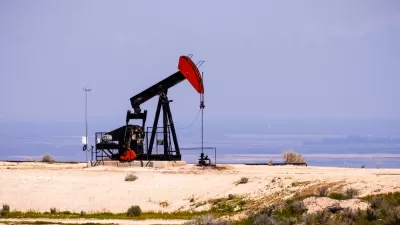Environmentalists charged that the new federal rules guiding hydraulic fracturing do not protect the environment and inform the public about the fracking process. The new Secretary of the Interior, Sally Jewell, appeared prepared for their comments.
John M. Broder reports on the revised, draft fracking rules issued by the federal government - specifically the Bureau of Land Management (BLM), a division of the Department of Interior, released May 16. He also reported on the initial rules released a year ago. Environmentalists were clearly displeased - which appeared to be anticipated by Dept. of Interior Secretary Sally Jewell. Note that the rules only apply to "public and Indian lands". Her response:
“I know there are those who say fracking is dangerous and should be curtailed, full stop. That ignores the reality that it has been done for decades and has the potential for developing significant domestic resources and strengthening our economy and will be done for decades to come.”
Broder adds that "Ms. Jewell worked in the oil industry in the late 1970s and proudly said that she fracked a few wells in Oklahoma."
Environmentalists charged that it was not in the public's interest for "operators ...to keep the composition of the drilling fluids secret."
"The draft BLM rules ignore the recommendations of the president’s own shale gas advisory committee, which called for transparency, full public chemical disclosure, environmental safeguards, and pollution monitoring," stated Michael Brune, Executive Director of the Sierra Club in their press release. Another major flaw was identified by Earth Justice, a non-profit public interest law organization dedicated to protecting the environment, in their press release:
- "The proposed rules do not require an evaluation of the integrity of cement barriers in individual wells—the critical barrier between toxic fracking chemicals and groundwater—instead allowing oil and gas companies to test one well and allow those results to guide the development of other similar wells."
The Department of Interor's press release (includes PDF link to 131-page draft rules) states they "establish commonsense safety standards for hydraulic fracturing on public and Indian lands."
The new proposal maintains important safety standards, improves integration with existing state and tribal standards, and increases flexibility for oil and gas developers. The updated draft proposal will be subject to a new 30-day public comment period.
However, the energy industry also appeared displeased, though perhaps not to the same extent as the environmental community. Their problem appeared more with the necessity for the rules. Kathleen Sgamma, vice president of government affairs for Western Energy Alliance, an association of oil companies, said: “While the current rule is better than the first impractical rule, D.O.I. still has not justified the rule from an economic or scientific point of view.
The 30-day comment period on the draft rules commences after they have been published in the Federal Register.
FULL STORY: New Fracking Rules Proposed for U.S. Land

Planetizen Federal Action Tracker
A weekly monitor of how Trump’s orders and actions are impacting planners and planning in America.

Congressman Proposes Bill to Rename DC Metro “Trump Train”
The Make Autorail Great Again Act would withhold federal funding to the system until the Washington Metropolitan Area Transit Authority (WMATA), rebrands as the Washington Metropolitan Authority for Greater Access (WMAGA).

The Simple Legislative Tool Transforming Vacant Downtowns
In California, Michigan and Georgia, an easy win is bringing dollars — and delight — back to city centers.

The States Losing Rural Delivery Rooms at an Alarming Pace
In some states, as few as 9% of rural hospitals still deliver babies. As a result, rising pre-term births, no adequate pre-term care and "harrowing" close calls are a growing reality.

The Small South Asian Republic Going all in on EVs
Thanks to one simple policy change less than five years ago, 65% of new cars in this Himalayan country are now electric.

DC Backpedals on Bike Lane Protection, Swaps Barriers for Paint
Citing aesthetic concerns, the city is removing the concrete barriers and flexposts that once separated Arizona Avenue cyclists from motor vehicles.
Urban Design for Planners 1: Software Tools
This six-course series explores essential urban design concepts using open source software and equips planners with the tools they need to participate fully in the urban design process.
Planning for Universal Design
Learn the tools for implementing Universal Design in planning regulations.
Smith Gee Studio
City of Charlotte
City of Camden Redevelopment Agency
City of Astoria
Transportation Research & Education Center (TREC) at Portland State University
US High Speed Rail Association
City of Camden Redevelopment Agency
Municipality of Princeton (NJ)



























